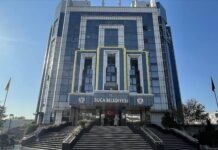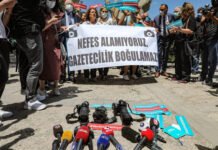Turkish prosecutors on Friday ordered the detention of 12 people, including currently employed civil servants, due to alleged links to the Gülen movement based on payphone call records, according to Turkish media reports.
As part of an investigation launched by the Ankara Chief Public Prosecutor’s Office, detention warrants have been issued for four civil servants, six people who were dismissed from their public service jobs by an emergency decree and two who earlier resigned from their positions.
Turkish President Recep Tayyip Erdoğan has been targeting followers of the Gülen movement, a faith-based group inspired by Turkish cleric Fethullah Gülen, since the corruption investigations of December 17-25, 2013, which implicated then-prime minister Erdoğan, his family members and his inner circle.
Dismissing the investigations as a Gülenist coup and conspiracy against his government, Erdoğan designated the movement as a terrorist organization and began to target its members. He intensified the crackdown on the movement following a coup attempt on July 15, 2016 that he accused Gülen of masterminding. Gülen and the movement strongly deny involvement in the abortive putsch or any terrorist activity.
The accusations leveled against the suspects include secretly communicating with their contacts within the movement via payphones. The detention warrants were issued based on lists drafted by the country’s National Intelligence Organization (MİT) detailing people who used payphones.
The so-called “payphone investigations” are based on call records. The prosecutors assume that a member of the movement used the same payphone to call all his contacts consecutively. Based on that assumption, when an alleged member of the movement is found in call records, it is assumed that other numbers called right before or after that call also belong to people with Gülen links.
Following the failed coup attempt, the Turkish government declared a state of emergency and carried out a massive purge of state institutions under the pretext of an anti-coup fight.
More than 130,000 public servants were summarily removed from their jobs for alleged membership in or relationships with “terrorist organizations” by emergency decree-laws subject to neither judicial nor parliamentary scrutiny.















